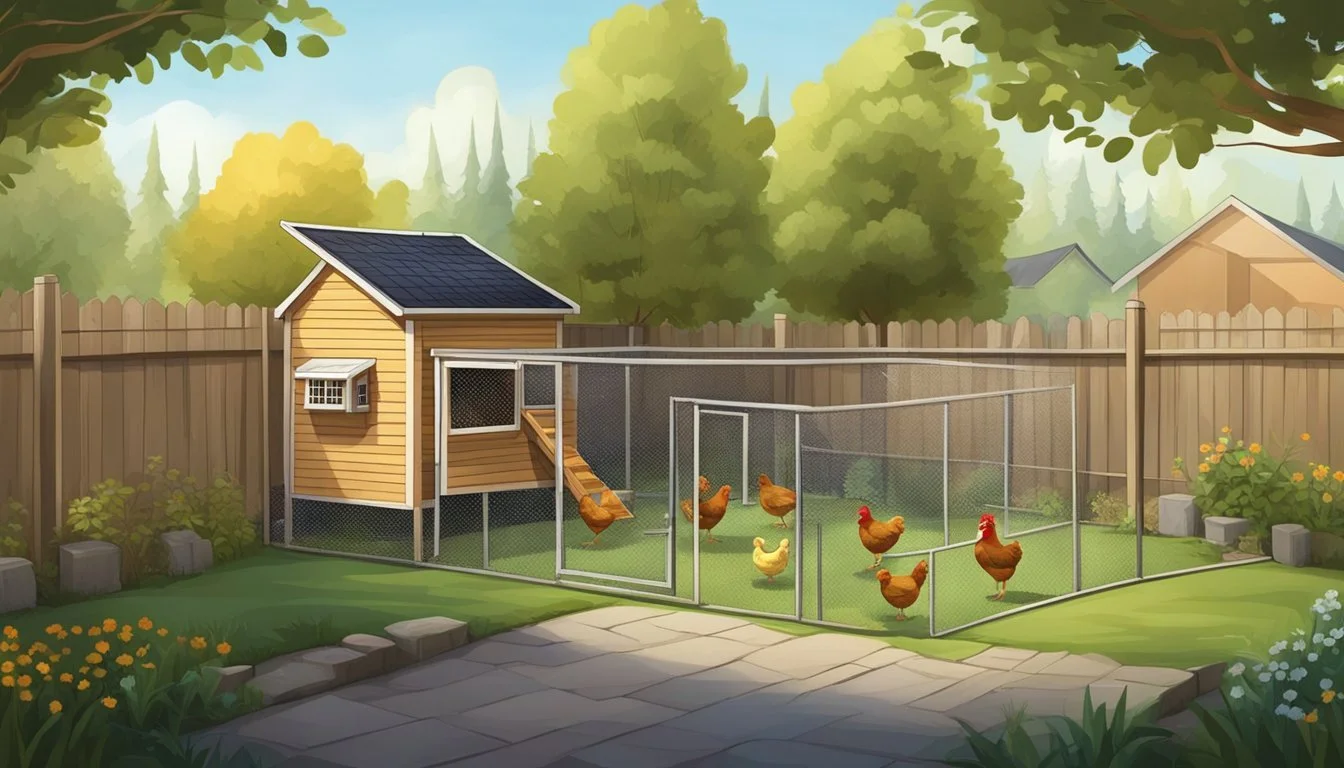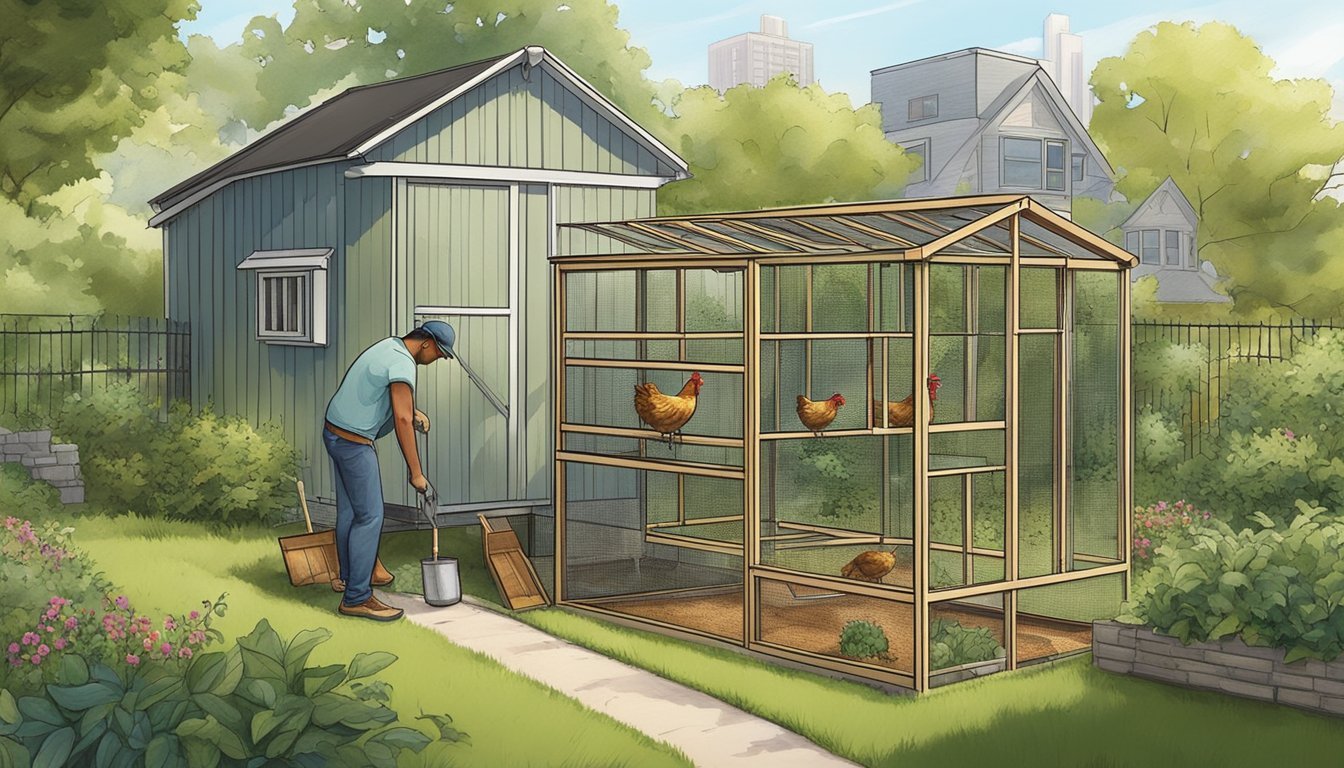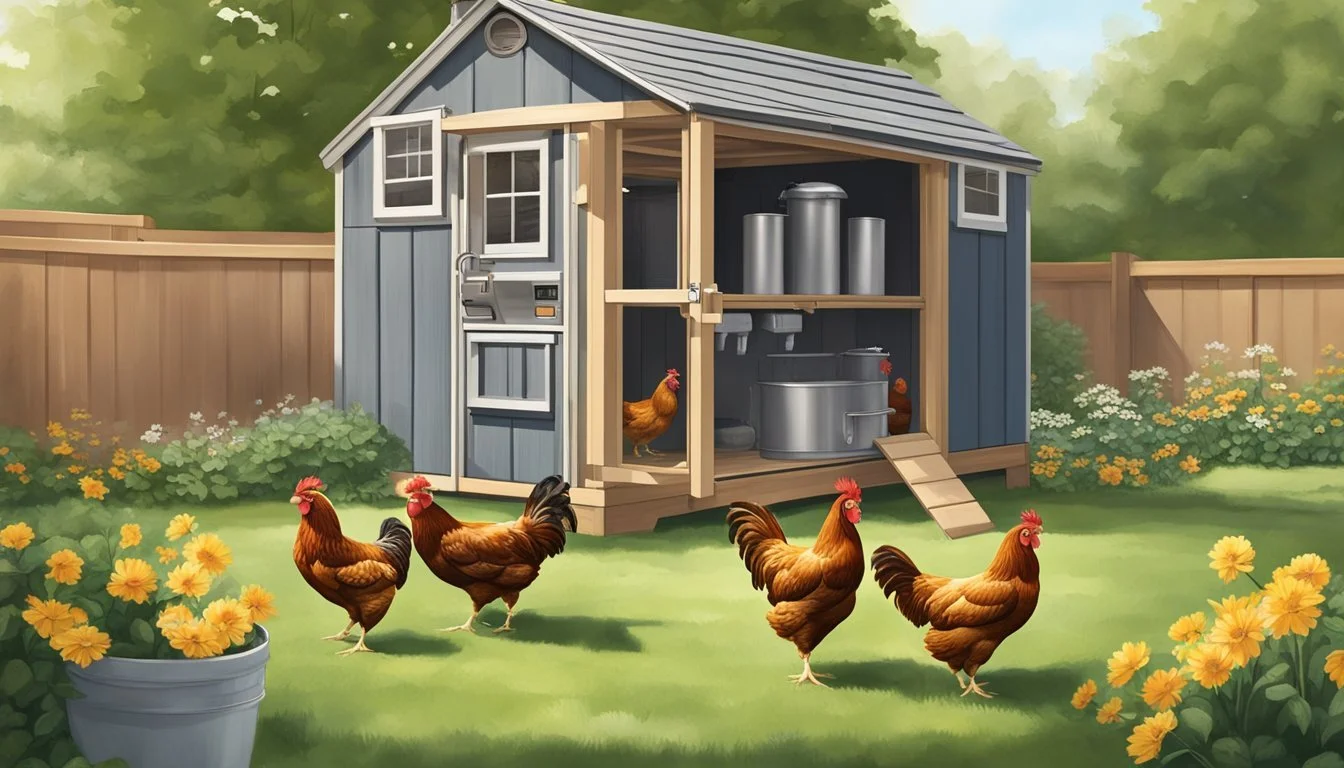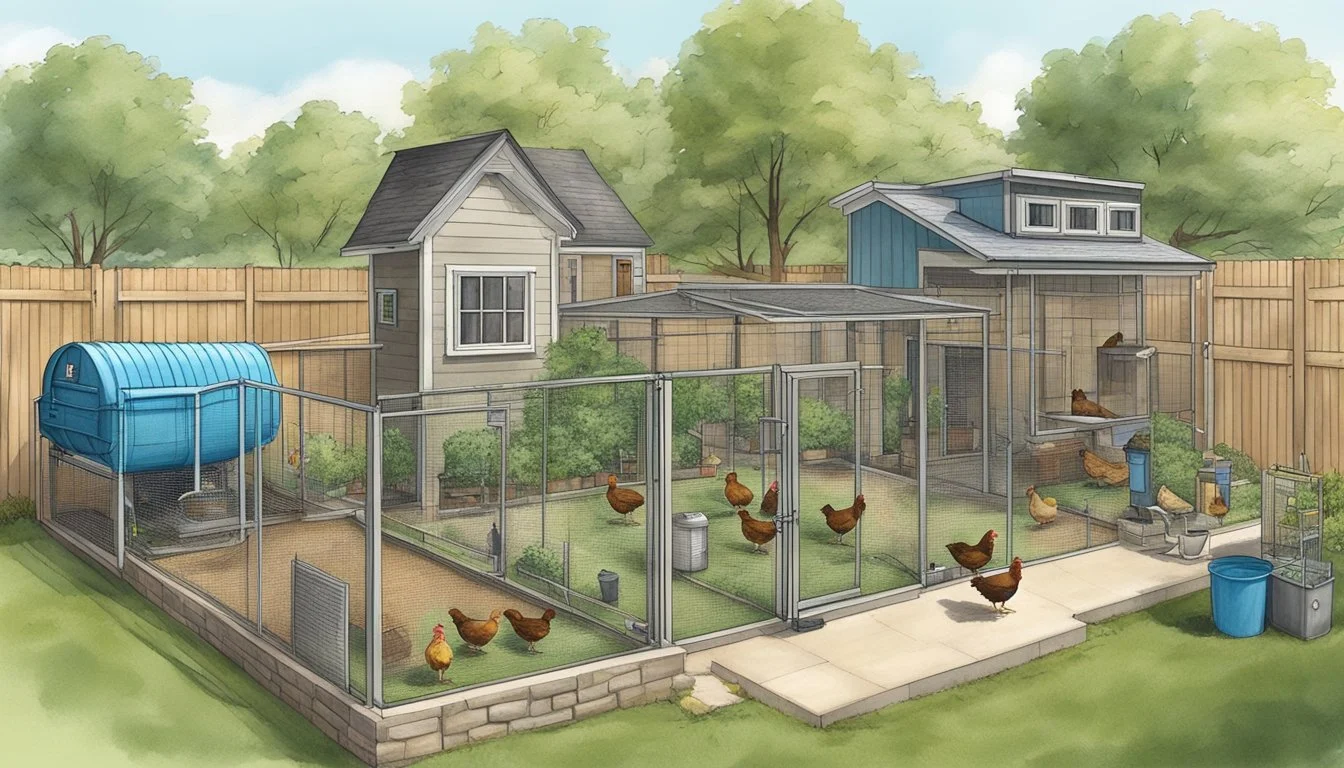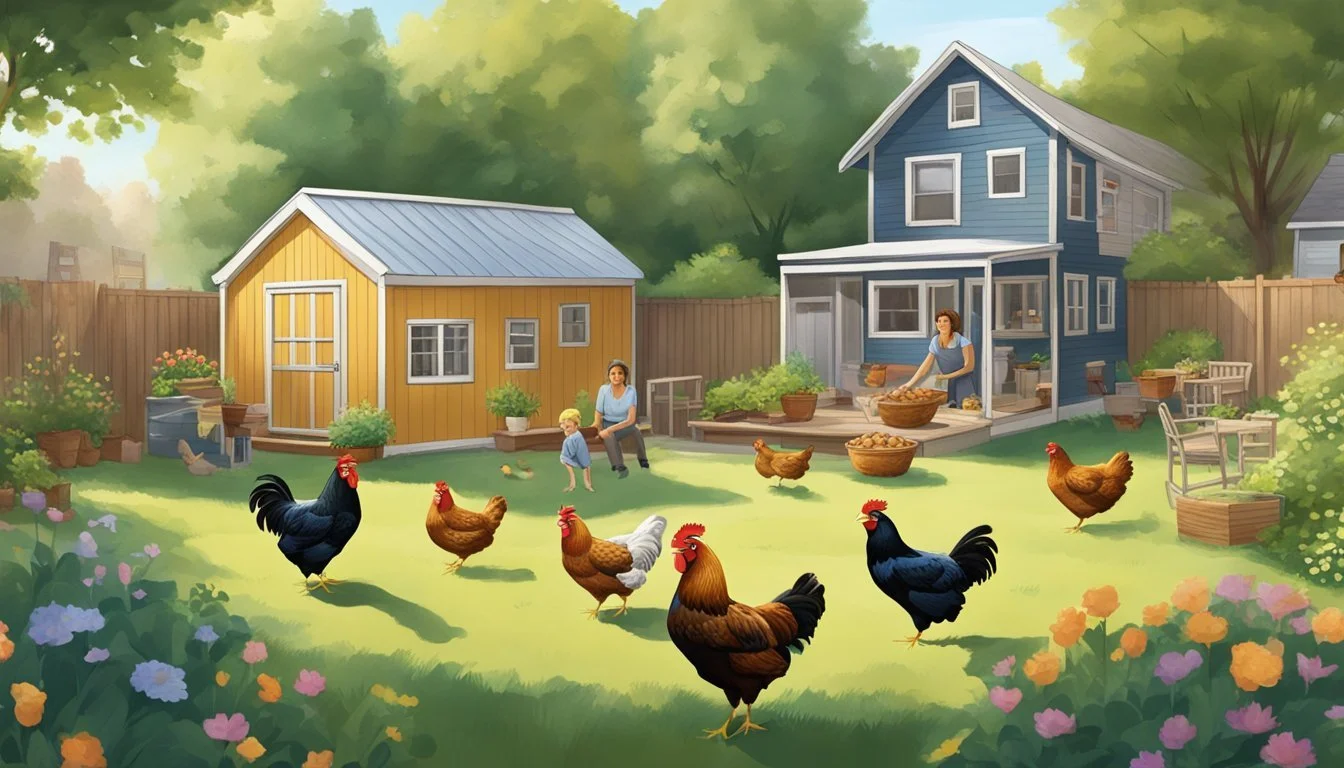Keeping Backyard Chickens in Chicago, IL
A Practical Guide to Urban Poultry Farming
Backyard chicken keeping has become increasingly popular in urban areas, with Chicago, Illinois being no exception. Residents of the Windy City find joy and practicality in raising chickens, which, apart from providing fresh eggs, contribute to sustainable living practices. In Chicago, the local laws permit keeping chickens for non-commercial purposes, enabling city dwellers to partake in this growing trend.
However, the City of Chicago has set forth specific regulations to ensure that backyard chicken keeping is safe, humane, and does not cause nuisances. The requirements dictate that coops must be secure enough to prevent chickens from escaping and must provide protection against predators. The cleanliness and size of these coops are also regulated to maintain a humane standard of living for the animals.
Illinois, as a state, upholds similar norms across its various cities, including Chicago, with each city having the discretion to implement and enforce its regulations. In adhering to these guidelines, Chicagoans can ensure their backyard chicken endeavors align with both the city's and the state's expectations for animal welfare and community harmony.
Legal Framework for Backyard Chickens
Residents considering keeping backyard chickens in Chicago, IL, must navigate various legal stipulations. This section provides a clear overview of the municipal codes, contrasts with nearby regions, and outlines the specific requirements and limitations imposed by local authorities.
Understanding Chicago's Municipal Code
Chicago Municipal Code permits residents to keep chickens on their property for non-commercial purposes. It mandates that chicken coops be constructed to prevent escape and ensure protection from predators. The code does not explicitly prohibit chickens in residential areas but emphasizes maintaining sanitary conditions and humane treatment.
Comparison with Surrounding Cities and Counties
In comparison to Chicago, surrounding regions such as Cook County, Lake County, Will County, DuPage County, Kane County, and McHenry County may have differing ordinances. Each city within these counties may have its own set of rules concerning the keeping of backyard chickens, thus it's imperative for residents to acquaint themselves with their particular local chicken laws.
Permit and Registration Requirements
Unlike some nearby suburbs, the City of Chicago itself does not currently require permits or registration for keeping backyard chickens. However, interested parties should verify with local aldermen or zoning offices as regulations can change and may differ across various Chicago neighborhood boundaries.
Limits and Restrictions on Number of Chickens
The city ordinances within Chicago's city limits do not set a clear limit on the number of chickens a resident can keep. Nonetheless, space constraints and zoning regulations may indirectly limit the quantity. Owners are advised to ensure their flock does not create public health issues or become a nuisance.
Roosters and Noise Ordinances
Roosters are permitted within Chicago, but residents must be mindful of noise ordinances. Continuous crowing that disturbs the peace, especially in the early morning, can lead to complaints and potential action by local authorities. It's essential for residents keeping roosters to mitigate noise to maintain amicable relations with their neighbors.
Setting Up Your Chicken Coop
Setting up a proper chicken coop in Chicago, IL requires attention to design, adherence to local regulations regarding placement, and ensuring protection against predators for the safety and comfort of the backyard chickens.
Coop Design and Construction
A robust coop is essential for keeping chickens safe and healthy. In Chicago, coops should be constructed with solid, weather-resistant materials and insulated walls to protect against the harsh winters. The design must include a roof to shield chickens from precipitation and provide shade during summer. Ventilation is crucial to prevent moisture buildup, which can lead to respiratory issues in chickens. Each chicken requires at least three square feet of space inside the coop, ensuring ample room to roam, rest, and feed.
Placement and Property Line Considerations
Coop placement is regulated by local zoning laws, and Chicago requires that coops be designed to prevent chickens from escaping and must be predator-proof. It is prudent to position the coop at least 25 feet away from the owner's residence and 100 feet from any neighbor's residence, aligning with city ordinances to minimize nuisance. One should also be cautious about the coop's orientation to ensure it does not disrupt the natural flow of the backyard or infringe upon property lines.
Protecting from Predators
Chickens in urban areas like Chicago are still vulnerable to predators such as raccoons and birds of prey. A chicken coop must be equipped with secure latches on all doors and windows. The coop should include wire mesh or hardware cloth over any openings, including ventilation windows, to prevent predators from gaining access. The coop's perimeter should also have a buried wire mesh skirt or a solid foundation to thwart digging animals. Regular checks for breaches or signs of attempted entry are necessary to maintain a secure environment for the chickens.
Daily Care and Management
The care and management of backyard chickens in Chicago require diligent attention to feeding and nutrition, appropriate lighting and sheltering, and rigorous cleanliness and waste handling practices.
Feeding and Nutrition
Chickens require a balanced diet to remain healthy, especially during Chicago's harsh winters. Owners should provide a consistent supply of quality poultry feed rich in protein. During colder months, supplementing with high-fat foods can help chickens maintain body heat and energy. Fresh water must be accessible at all times and should be kept from freezing. Here's a basic feeding guideline:
Chick Starter Feed: Up to 8 weeks old
Grower Feed: 8-20 weeks old
Layer Feed: Beyond 20 weeks or when hens start laying eggs
Grit: To aid digestion
Oyster Shells: For calcium to support eggshell strength
Light and Shelter Requirements
Adequate shelter and lighting are vital to ensure the chickens' productivity and welfare. Their coop should be well-insulated, draft-free, but still ventilated to prevent moisture buildup which can lead to frostbite. Coops must be elevated off the ground to deter predators and should be designed to withstand Chicago's snow and wind. Chickens require about 14 hours of light per day to maintain egg production, which may necessitate artificial lighting during shorter winter days.
Cleanliness and Waste Handling
Maintaining a clean coop is essential to prevent disease and pests. The coop should be cleaned regularly, with a thorough cleaning performed every few weeks depending on the flock size. Bedding should be kept dry and be replaced if it becomes damp or soiled. Manure needs to be managed properly; it can be composted but must be done so in a manner that does not attract rodents or pose a health risk. Implementing a waste handling routine is critical:
Daily: Spot-clean and remove any soiled bedding.
Weekly: Replace nesting box materials.
Monthly: Perform a deep cleaning of the coop's interior.
Health and Safety Considerations
Maintaining the health and safety of backyard chickens in Chicago involves regular inspections, proper handling, and adherence to legal requirements. This ensures not only the well-being of the chickens but also the safety of the community.
Regular Inspections and Disease Prevention
Regular inspections are crucial for preventing the spread of diseases among backyard chickens. The presence of clean water, food, and a sanitary environment are essential. Owners may be required to present health certificates for their chickens, and the city is authorized to conduct inspections in response to complaints, thereby ensuring a safe and disease-free flock.
Keeping Chickens Safe from Harm
To keep backyard chickens safe, their enclosures must be humane, adequately sized, and secure from predators. A clean and sanitary shelter protects the chickens from the elements and pests. The coop and its surroundings must be regularly maintained to prevent the accumulation of waste, which can attract predators and cause health issues.
Legal Aspects of Slaughter and Meat Handling
Chicago law prohibits the slaughter of certain farm animals, including chickens, within city limits. Therefore, owners must be familiar with the legal framework regarding the slaughter and handling of chicken meat if they intend to use their chickens for consumption. This ensures meat is processed in a manner that is both legal and safe.
Community and Educational Aspects
The advent of backyard chicken keeping brings unique opportunities for community engagement and education. Chicagoans leverage local legislation expertise and dedicated educational resources to foster a well-informed and involved chicken-keeping community.
Engaging with Local Chicken Laws Consultants
Local experts serve as consultants to help residents understand Chicago's chicken laws. They guide individuals on how to maintain compliance with regulations that require coops to prevent both escape of chickens and potential predator intrusions. By consulting with these professionals, prospective and current chicken keepers ensure they adhere to municipal guidelines while contributing to the city’s urban agriculture scene.
Fact-Based News and Educational Resources
Chicago offers a wealth of resources for backyard chicken enthusiasts who seek fact-based news and educational content. Resources range from newsletters offering comprehensive guides on proper chicken care to programming from stations like WBEZ, which provide Chicagoans with up-to-date information and discussions on the wider implications of urban poultry keeping.
Community Integration and Acceptance
Community acceptance is pivotal for the success of urban chicken projects. Through outreach and educational programs, communities become more integrated, leading to a broader acceptance of backyard chickens. Such efforts underscore the benefits of keeping chickens, like waste reduction and the production of fresh eggs, helping to weave chicken keeping into the community’s fabric.
The Benefits of Raising Chickens
Raising chickens in Chicago offers tangible rewards, from the provision of fresh eggs to the creation of educational experiences for families.
Egg-Laying and Fresh Egg Benefits
When one maintains a backyard flock, a primary advantage is the egg-laying capability of hens. The eggs they produce are known for their freshness and taste which can surpass store-bought alternatives. Nesting boxes should be provided for hens to lay eggs, ensuring that they are comfortable and more productive. Not only do residents of Chicago have the pleasure of collecting these eggs daily, but they also have control over their flock’s diet, contributing to the organic quality of the produce.
Freshness: Eggs from backyard chickens are typically fresher than those bought from a store.
Taste: Many people notice a taste improvement in eggs from chickens raised at home.
Organic: Control over one’s flock’s diet leads to organic egg production.
Educational Opportunities
Chickens offer more than just eggs; they serve as a valuable educational tool, especially for children. Caring for a backyard flock allows individuals to learn about animal husbandry, responsibility, and the food cycle. This hands-on experience with nature encourages a connection to local food sources and teaches the importance of sustainable practices.
Final Thoughts
When residents decide to keep backyard chickens in Chicago, it's essential they adhere to the local regulations ensuring their practice is responsible and neighbor-friendly.
Housing: Chicken coops should be sturdy, predator-proof, and designed to prevent any unintentional escape. Consideration for the chickens' well-being is paramount, with clean water and feed necessary at all times.
Legal Compliance: The current laws enable Chicago residents to own chickens for non-commercial purposes. This guideline encourages urban agriculture while maintaining public health and safety.
Community Relations: As a part of a densely populated urban environment, chicken owners should take steps to minimize the potential for nuisances.
Ongoing Education: Potential chicken owners should educate themselves about poultry care. With proper knowledge, they can ensure the health of their chickens and the safety of the community.
The integration of backyard chickens into Chicago's urban landscape showcases the city's progressive approach to sustainable living practices. By staying informed and respectful, chicken owners in Chicago can contribute positively to the community and enjoy the rewards of urban agriculture.


